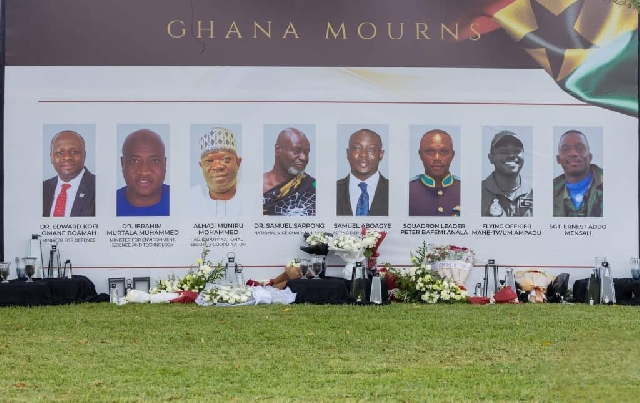Beyond the Adansi crash: Why Ghana must liberalize its airspace
 Z9 helicopter crash victims
Z9 helicopter crash victims
The recent military aircraft crash in the Ashanti Region has reignited urgent conversations around safety, security, and the need to fix what should be simple systems. As has become a troubling norm, these discussions only seem to gain traction when lives are lost. Perhaps, the first time in recent history, Ghana’s aviation sector will soon come under intense scrutiny.
Calls for an independent body to investigate the crash are entirely legitimate. While an army-led inquiry may offer technical depth, the loss of prominent public figures on a national assignment demands a level of impartiality that a purely military investigation cannot guarantee.
This also raises important legal questions and perhaps issues about overlapping institutional mandates. The Ghana Civil Aviation (Amendment) Act, 2019 (Act 985) empowers the Director-General and or of the Civil Aviation Authority to lead investigations of this nature. Moreover, the Aircraft Accident and Incident Investigation and Prevention Bureau established in 2020 may lack the full capacity to handle a case of this magnitude, but it is a legally recognized body mandated to do so.
In this context, the demand for internationally recognized best practices to guide the inquiry is also only valid and essential over the ad hoc investigative committee currently in place.
Difficult as it may be, the call to re-examine and retool Ghana’s military deserves serious national attention. The late Defence Minister appeared to share this ambition, hinting during his vetting that military modernization would be “on the front burner.”
In a recent conversation, aviation expert Dr. Issaka Yakubu Akparibo agreed, stating that “the Airforce requires new air assets.” He adds, “You don’t have an aircraft that can buzz a rogue aircraft out of our airspace.” He recommends acquiring fighter jets such as the F-16 or Hawk to bolster national defense capabilities.
While Ghana has capable aviation experts, we must also explore strategic partnerships, from the current investigation board through to implementation of recommendations. The crash presents an opportunity for reflection, growth, and a broader conversation about our investments in national security, including the fight against illegal mining.
It also invites us to ask difficult but necessary questions: Are we ready to invest in a presidential jet? Are we prepared to build a resilient aviation sector?
Private Sector Partnership
Consider the example of Korean Air, which suffered repeated crashes over 29 years until 1999. The turning point came when the airline re-examined cultural nuances and adopted practices from more liberal counterparts such as using a common language (English) to improve cockpit communication and safety.
The Adansi crash offers Ghana a similar opportunity: to explore solutions, forge futuristic partnerships, and build a resilient aviation sector across Africa. The space is complex, but progress is not impossible.
One place to start is by opening up the sector to private players. Aviation is not an industry to monopolize. A market-driven environment fosters innovation, competition, and practical solutions. Consider this, after the Air India crash, Tata Group proposed liberalizing maintenance operations taking on pre-flight inspections, minor repairs, and troubleshooting to allow the best qualified companies to handle them.
Outsourcing military maintenance to private firms may sound appealing but Dr. Akparibo cautions against it on national security grounds.
“I do not agree with outsourcing of military maintenance operations. This should be done only if we have a local Ghanaian company with that capability. The reason is that military assets are a national security issue, and you cannot let a foreign national perform such an activity,” he said.
He emphasized that such contracts must remain with Ghanaian nationals. “Northrop Grumman is the contractor that handles the USA military assets, and you cannot work there if you are not a USA national with national security clearance,” he added.
But it can be argued If Ghana’s aviation industry were more open, and if the military’s maintenance regime were less rigid or closed, perhaps a private company could have detected and resolved issues with the crashed aircraft. Perhaps such a company could have partnered with the armed forces to fix broken assets. Perhaps our president wouldn’t need to rely on his brother’s jet to travel.
For a country trying to reset and fix core systems for the benefit of all citizens, government monopolies can quickly become stagnant and overwhelming. Too often, governments undermine their regulatory role by chasing control rather than oversight missing the more powerful, lucrative opportunity of regulation. Control tends to collapse whereas regulation builds resilience.
Public skepticism around a national carrier and a presidential jet stems from Ghana’s poor track record in transparency and management of previous initiatives. The military has not been culturally forthcoming about its spending (not only in Ghana) which undermines sometimes public trust and makes it easier to argue for diverting funds to other sectors like infrastructure and health.
Yet Dr. Akparibo counters that a presidential jet is standard practice globally. “As a country, we need to have a VIP/presidential fleet under the Airforce. That’s the standard,” he said.
When the investigative committee concludes its work, it is important that recommendations are fully implemented. Also, it will be in the interest of every agency involved especially the military to open itself up to internal and external scrutiny. National security is not just about systems and protocols; it begins with public trust in the personnel and structures tasked with safeguarding the nation. Transparent operations, recruitment, and contracting processes will help restore public trust. And that trust will cascade into broader confidence in aviation and national security.
The crash also highlights the need for a deliberate government investment into aviation infrastructure and human capital. A public-private sector led approach is a strong starting point, especially if government remains uncertain about fully privatizing the sector.
Strengthening the regulatory framework to ensure safety is critical. Equally important is investing in education and training for aviation professionals. Academia has a unique ability to influence and ground change in communities and Ghana’s strategic position in the sub region presents an opportunity to establish a fully-fledged aviation academy to serve both national and regional needs.
Ebenezer De-Gaulle, a media practitioner, is the Vice President at Institute for Liberty and Policy Innovation (ILAPI), Ghana.
Source: Ebenezer De-Gaulle, ILAPI







